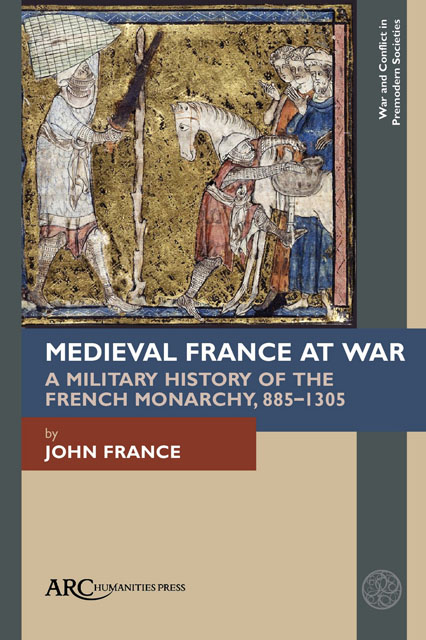Book contents
- Frontmatter
- Contents
- List of Illustrations
- Preface
- Introduction
- Chapter 1 Technology and Warfare
- Chapter 2 The Emergence Of France
- Chapter 3 French Monarchical Power in Context
- Chapter 4 Warfare In France To 1066
- Chapter 5 A Clash Of Dynasties 1066– 1180
- Chapter 6 Philip Ii and The Rise of France
- Chapter 7 The Expansion of France
- Chapter 8 Louis Ix and The Apogee Of French Power
- Chapter 9 The Problems Of Power
- Chapter 10 Perspectives on The Army of The Kings of France
- Bibliography
- Appendix: A Note on Sources
- Index
Chapter 7 - The Expansion of France
Published online by Cambridge University Press: 06 April 2023
- Frontmatter
- Contents
- List of Illustrations
- Preface
- Introduction
- Chapter 1 Technology and Warfare
- Chapter 2 The Emergence Of France
- Chapter 3 French Monarchical Power in Context
- Chapter 4 Warfare In France To 1066
- Chapter 5 A Clash Of Dynasties 1066– 1180
- Chapter 6 Philip Ii and The Rise of France
- Chapter 7 The Expansion of France
- Chapter 8 Louis Ix and The Apogee Of French Power
- Chapter 9 The Problems Of Power
- Chapter 10 Perspectives on The Army of The Kings of France
- Bibliography
- Appendix: A Note on Sources
- Index
Summary
BOUVINES ESTABLISHED PHILIP as a major power in Europe, on a par with the emperor, and conferred great prestige upon his fighting forces. There were limits to its benefits within France, however. The rights of the great nobles continued to be respected, even those of Ferrand’s wife in Flanders, though Prince Louis exploited the county harshly. When Prince Louis, by then Louis VIII (1223– 1226), died unexpectedly in 1226 he left a child, and some of the nobles tried to exploit this situation, in what Dominique Barthélemy has called the “fronde des barons.” In fact, Barthélemy argues that the French king’s powers over the high nobility remained somewhat precarious until the time of St. Louis, but it is difficult to see how his reform of government would ever have been possible without Bouvines.
The Invasion of England
The truce at Chinon did not end the war with John, however, for victory created an appetite for more glory. In England many of the barons rebelled, driven by the financial exactions and the personal vindictiveness of John. In May they persuaded London to join them, forcing John to agree to the Magna Carta on June 15, 1215. By August 15, however, he was absolved from the obligations it placed on him by Innocent III, who was anxious to support, as he saw it, a vassal against rebels and a sworn crusader against those whose actions delayed his departure. England now fell into civil war, and many of the rebels appealed to Philip’ son, Prince Louis, to be their king. Philip and Louis delayed, however, while the rebels in London were inactive. John organized an efficient, largely mercenary army, which attacked Rochester on October 13. This was a very strong castle, whose great donjon still stands, but John pressed the siege. He mined one of the corner towers of the donjon, commanding his justiciar: “We order you to send to us night and day with all haste 40 bacon pigs of the fattest and those less good for eating to use for bringing fire under the tower.” To this day the result is visible, for, after the tower collapsed, it was rebuilt as a round tower, quite distinct from those on the other three sides.
- Type
- Chapter
- Information
- Medieval France at WarA Military History of the French Monarchy, 885-1305, pp. 147 - 164Publisher: Amsterdam University PressPrint publication year: 2022

